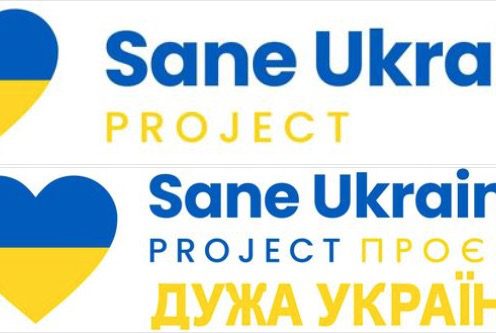
Trauma Response Tools - Helping Ukrainians With Their Resilience To War
It is hard to imagine what is happening in other people's worlds when their lives get torn apart. We all react differently to the news, but the reality of the war in Ukraine has impacted us all.
It can be helpful to be 'trauma-informed'; when you are witnessing this kind of event unfolding. This will help you understand your own reactions, what is happening in your body, and how it is impacting your physical and psychological health.
Being trauma-informed can also aid you in understanding why and how someone else is reacting, without making things worse for them or yourself.
Psychological trauma & physical stress
Psychological trauma and physical stress responses are unavoidable when dealing with uncontrollable traumatic events or natural disasters.
The Flight or fight trauma response or the sense of life threat are the normal responses to traumatic experiences. We will look at them in more detail, but for now I want you to understand that these are the natural reactions for your body and nervous system to have in the abnormal circumstances of traumatic events like the war in Ukraine.
Constant heightened arousal state
If you have been paying attention to the news, you may have seen some presenters in tears on TV. You might also have read a lot of disturbing articles about the war in Ukraine. All of this information and intense media can be tough to take in.
Witnessing innocent people being impacted or killed by such a traumatic event can leave you with feelings of powerlessness, hopelessness, anxiety, dread, and guilt or shame - just for having a nice day when someone else is suffering!
If you have experienced trauma in your childhood, these may be feelings you have struggled with all your life.
The war in Ukraine is not the first time that something bad has happened. A lot of people have seen things like this before. But it seems like something bad, like a pandemic or natural disaster, is less likely to be caused by people doing bad things on purpose.
What's particularly traumatic here is a sense of it being avoidable. However, that is a whole other subject.
How are your mind and body responding?
Different people will have varying responses to what is happening in Ukraine.
Your trauma response will be impacted by:
The internal resources you have, so if you are exhausted or ill, it is harder to cope with trauma.
A relationship or connection with someone or something in the danger zone, you could be experiencing the threat of loss or damage to that person, place or thing.
Adverse 'own experiences' in childhood, so if the trauma response re-triggers a conscious or unconscious memory or sensation this can flood your system with stress hormones of adrenaline and cortisol whilst you are dealing with, confusion, and overwhelm.
You may feel confused and unsure about why you can't think clearly or concentrate.
For many people, witnessing the war may be triggering memories of acts of violence or powerlessness they have stored away from childhood trauma that they have not resolved in their adulthood.
The amount of time you focus on the war in Ukraine. Already I am seeing clients whose mental health is overwhelmed, literally because they actively watch, read and take in too much traumatic information. It is best to limit yourself to the amount of traumatic stress content that you take in each day.
If you are watching images of war, and you are prone to the impact of traumatic experiences, then minimise your exposure.
There is so much evidence to say that your subconscious will not understand the difference between your experience of witnessing an event from a distance or actually being in it.
This is also why visualising yourself being successful in something before you do it is so powerful. Your body/mind does not necessarily differentiate between what is actively happening and what is imagined.
Whether you are predisposed to CPTSD
If you have a history of complex trauma, then the current situation could be very harsh to process. However, for some people, the fact that it is a collective experience of many can make it easier to process than when it is a secret experience you have had in isolation
Different Stages of trauma
There are various stages of trauma, so here is a brief outline:
Acute stress disorder
This is when you have been around a traumatic event and you are still impacted by it with common reactions for 3 -30 days. This could be something like a natural disaster, a rape or other one-off experiences.
If you get enough support, you may be able to process, absorb, and release the impact of what has happened.
Post traumatic stress disorder (PTSD)
This is when you are still suffering strong emotional trauma symptoms after a few weeks from the event. These symptoms could be flashbacks of an event; chronic anxiety about that event repeating itself; numbness to the extreme body feelings of that event; lack of energy from suppressing the trauma; inability to eat very much, lack of capacity to communicate with others.
This may not be obvious for people in the midst of war, as they are completely in survival mode. At this point, for people in Ukraine, it is more about trying to reduce the trauma load, rather than resisting or trying to stop the experience of trauma which would be impossible to do.
Delayed onset PTSD
This is when symptoms show up 6 months after the event. It is a way the body-mind gets us out of the place of danger, although the trauma chemicals and memories have simply been lying dormant.
This could well happen for refugees and soldiers once they are away from a place of danger.
Complex posttraumatic stress disorder (CPTSD)
This is when a series of traumatic events, may have happened over a drawn-out period creating mental disorders from:
Preverbal and adverse childhood experiences
When young people have witnessed and absorbed terrifying or disturbing experiences, but had no capacity to understand or express them. This can also include having to stay silent about it.
Being an adult victim of domestic abuse
This can relate to when you have lived in traumatic environments and had to tolerate sustained intolerable behaviour or violence, sexual or psychological abuse.
Becoming a prisoner or feeling trapped and unable to escape danger
This could be where you have been held against your will. Or you are being invaded and attacked, whilst feeling like a powerless victim.
This is currently the case in Ukraine, where the country is currently mobilised and fighting for its freedom.
Any of the above could mean you may struggle with processing large-scale perceived danger.
Trauma Responses
Fight or Flight
These are physical reactions in your sympathetic nervous system. When the flight response is triggered your hormone adrenaline kicks in want to run away from danger, or the fight response mobilises you into defence and protection mode.
This system is important in normal day-to-day life to get you moving and into action. However, it is not good for our health when it is an ongoing response to danger.
Freeze Response
This takes place in your parasympathetic nervous system and is also known as the trauma fawn response. In this stress state, your body immobilises into a state of subtle paralysis. Levels of the hormone cortisol literally make you numb and dissociate from the sensation in your body.
These are all common responses and can keep you on high alert. This level of trauma can damage your health if you are unable to reduce stress.
How to regulate your body during a disturbing event
The ability to gain control over traumatic stress will depend on the individual's ability to self-regulate.
The reality is that your body is not designed to relax and chill when you are in danger. If your own life is in danger, your body is primed to immediately react. So even if you are experiencing trauma responses, it can mean you are completely healthy.
Severe trauma syndromes are when you are out of danger but are unable to regulate your physical or mental health to feel safe.
Dr Robert Naviaux describes this as the Cell Danger Response, where the mitochondria in your cells have switched to alert mode, instead of energy production mode.
It can be important to get professional help or find a licensed therapist who is trauma-informed, to find healthy ways to release feelings of trauma in a positive way to help switch off this response.
Currently, with the people suffering in Ukraine, it is important to encourage their exploration of ways they can do this. Even in the midst of what is happening, whether or not they are in the firing line, at some point they may need to navigate the mental and physical impact of this war.
This is the same for you, as in my experience, observing trauma of others from the sidelines, is still a difficult experience being absorbed into your body. So it is important to acknowledge this and connect with the feelings you have around it.
Trauma Symptoms
Trauma symptoms are normal reactions to an abnormal traumatic experience.
Psychological symptoms
Trauma survivors often experience sleep disorders, anxiety and depression, emotional reactions, traumatic memories. and suicidal thoughts.
Physical symptoms
Traumatic experiences can lead to physical distress including headaches, backache, digestive problems, hormonal problems, addiction and inflammatory diseases.
Often, pathologies like fibromyalgia, chronic fatigue syndrome, ME and IBS, can be linked back to traumatic periods in the history of the clients.
Often the symptoms themselves can create further trauma because of the impact they have in stopping you from having a normal routine.
Also if you have difficulty falling asleep, it is very difficult for your body and mind to get the rest they need, so intrusive thoughts or other forms of confusion keep creating more feelings of anxiety or depression.
The Campaign for Sane Ukraine
As a practitioner, I have specialised in Body-Mind trauma for many years. I also have extensive experience of having to apply many trauma resilience tools in my own life.
Social Engagement
Social engagement is one of the essential elements for trauma survivors to create the safety state required to regulate and calm down their nervous system.
Daily Sane Ukraine sessions for Ukrainians with trauma resilience trainers are designed to bring Ukrainians from all over the world together to create this safe social engagement in a held healing container.
Trauma-Informed Learning
The Sane Ukraine sessions combine trauma-informed learning by trainers sharing resilience tools to help Ukrainians process and reduce the levels of their traumatic experiences.
Different resilience tools will work differently for different people, so its important to have a variety to choose from.
In my own experience during an extremely challenging process of 3 separate court cases to leave a 20 year marriage, in the past few years, I literally had to discover which tools worked best for me at different times and in different situations.
Sometimes the breath, sometimes feeling into the body, other times serious levels of exercise. On top of conversation, connection and spending lots of time with my beautiful little dog going for long walks!
Trauma Resilience Trainers
What I learned, and what we as a group of trainers are facilitating, is teaching how the capacity to regulate the trauma response lies within the body.
It doesn't need to be suppressed with an addictive substance, it doesn't need to be medication, it needs to be understanding and implementing self-regulation.
I am not saying it is wrong to do any of the above, just that our body's are designed to regulate themselves even when in incredible depths of stress and duress.
My own experience
It was before one particular court hearing, where I had to self-represent, (I could not afford legal representation) while a barrister was being paid vast sums of money to annihilate me, that a deep profound clarity came from within and told me exactly what I needed to do in my body to stay safe and 'Sane'.
Actually, I realised within my body, just as I had immediate reactions to trauma, I could also create immediate self-regulation responses, to create sensations of safety and alignment, where the connection is an immediate experience of inner calm, strength, and power, in the midst of intimidation and attack.
You have to keep connecting, practicing, remembering, until these processes become second nature. They will then lower the noise of your traumatic experience. You then have a significant relationship with self-regulating of yourself.
You may find it hard to relate to this because the only way to understand it is to be like a scientist and experiment with it in your own body.
The road to trauma resilience is not always easy, but it is worth it. By using these tools, Ukrainians will rebuild their lives and regain their strength.
Do you need support with self-regulation?
If you are struggling with your response to what is happening in the global conflict, or in your immediate world, you may be interested in trauma resilience sessions. If so get in touch here
Trauma creates collapse, whereas engagement within the body creates stamina and an immediate sense of internal support and calm power.
Conclusion
Finally, it is essential to take care of yourself both physically and emotionally. This includes eating healthy foods, getting enough sleep, and exercising regularly. Connecting with nature can also be very calming and healing. Taking time for yourself to do things you enjoy can help you relax and de-stress.
Clearly for people trapped in Ukraine, they may be limited in how much they can do this, but even finding one positive each day is a resilience tool.
Stay busy, do good stuff, practice gratitude and be sure to take good care. Keep focusing on the collateral beauty that is always present when we take a moment to observe the bigger picture.
An immediate resilience tool you can access is The 10 Minute Fix


Comments